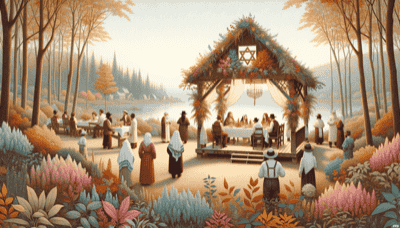We're here to help you keep count of the days to or since a date. Just click the button below and enter your chosen date to get started. Also choose the suggested days or search for a special day above #countingthedays

Date and Significance: The first day of Sukkot, also known as the Feast of Tabernacles, is a Jewish holiday celebrated on the 15th day of the Hebrew month of Tishrei. It commemorates the Israelites' forty-year journey through the desert after the Exodus from Egypt and God's provision during that time. In Canada, as in other parts of the world, Jews observe this festival with various traditional practices.
Traditions and Observances:
Building a Sukkah: Jewish families build temporary outdoor huts called sukkahs, which are reminiscent of the shelters used by the Israelites. The sukkah is decorated with fruits, vegetables, and other natural materials.
Dwelling in the Sukkah: People spend time eating meals in the sukkah and some may choose to sleep there as well, weather permitting.
Four Species: Participants perform a waving ceremony with four species of plants (etrog or citron, lulav or palm branch, hadassim or myrtle twigs, and aravot or willow branches), symbolizing unity and harvest.
Community Celebrations: In Canada's Jewish communities, synagogues often organize communal meals in large sukkahs. There may also be special services and events for children.
Cultural Impact: Sukkot provides an opportunity for Canadian Jews to connect with their heritage and religious traditions. It serves as a reminder of gratitude for shelter and sustenance. Non-Jewish Canadians may also observe their neighbors' celebrations or be invited to join them in their sukkahs.
First Day Specifics: The first day is particularly significant as it marks the beginning of this seven-day festival (eight days outside Israel). It is treated like a Sabbath with restrictions on work and an emphasis on religious observance.